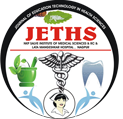- Visibility 282 Views
- Downloads 221 Downloads
- Permissions
- DOI 10.18231/j.jeths.v.12.i.2.4
-
CrossMark
- Citation
Evaluating the impact of a self-instructional module on nurses knowledge of enteral tube feeding in selected healthcare settings
Background: Nutrition is fundamental to sustaining life. In situations where individuals are unable to consume food orally-due to illness, gastrointestinal dysfunction, or surgical procedures-nutritional support must be administered via alternative methods. These include enteral nutrition (tube feeding into the digestive system) and parenteral nutrition (intravenous feeding). Among healthcare professionals, particularly nurses, adequate knowledge of enteral feeding is critical to ensuring safe and effective care.
Aim: This study aimed to evaluate the effectiveness of a self-instructional module (SIM) in enhancing the knowledge of staff nurses regarding enteral tube feeding in selected hospitals in Mandya.
Materials and Methods: A pre-experimental one-group pre-test post-test design was utilized. A total of 60 staff nurses from MIMS Hospital, Mandya, were selected through non-probability purposive sampling. Data were gathered using a structured 30-item knowledge questionnaire. Following the pre-test, the SIM was administered, and knowledge levels were reassessed in a post-test. Data were analyzed using descriptive and inferential statistics.
Results: Pre-test results indicated that 70% of participants had moderately adequate knowledge, while 30% had inadequate knowledge; none demonstrated adequate knowledge. After the intervention, 76.66% attained adequate knowledge and 23.33% had moderately adequate knowledge. The mean knowledge score improved significantly from 15.5 (51.66%) to 25.9 (86.33%), reflecting a mean increase of 10.4. A paired t-test confirmed the significance of this improvement (t = 34.89, p < 0.001). A statistically significant association was observed between the clinical area of practice and pre-test scores (χ² = 7.8, p < 0.001), while no other demographic variables showed significant associations.
Conclusion: The self-instructional module proved effective in improving nurses' knowledge of enteral tube feeding. The findings underscore the importance of continuous education and structured training programs to ensure safe, consistent, and informed nursing practices in enteral nutrition. The study recommends the implementation of standardized, evidence-based enteral feeding protocols and ongoing professional development initiatives.
References
- Bischoff SC, Austin P, Boeykens K, Chourdakis M, Cuerda C, Jonkers-Schuitema C, et al. ESPEN guideline on home enteral nutrition. Clin Nutr. 2020;39(1):5–22.
- Bankhead R, Boullata J, Brantley S, Corkins M, Guenter P, Krenitsky J, et al. Enteral nutrition practice recommendations. JPEN J Parenter Enteral Nutr. 2009;33(2):122–67.
- Löser C, Aschl G, Hébuterne X, Mathus-Vliegen EM, Muscaritoli
- M, Niv Y, et al. ESPEN guidelines on artificial enteral nutrition- -percutaneous endoscopic gastrostomy (PEG). Clin Nutr. 2005;24(5):848–61.
- Stroud M, Duncan H, Nightingale J; British Society of Gastroenterology. Guidelines for enteral feeding in adult hospital patients. Gut. 2003;52 Suppl 7:vii1–12.
- Mehta NM, Duggan CP. Nutritional deficiencies during critical illness. Pediatr Clin North Am. 2009;56(5):1143–60.
- Joosten KFM, Hulst JM. Malnutrition in pediatric hospital patients: current issues. Nutrition. 2011;27(2):133–7.
- Brinksma A, Huizinga G, Sulkers E, Kamps W, Roodbol P, Tissing W. Malnutrition in childhood cancer patients: a review on its prevalence and possible causes. Crit Rev Oncol Hematol. 2012;83(2):249–75.
- Metheny NA, Frantz RA. Head-of-bed elevation in critically ill patients: a review. Crit Care Nurse. 2013;33(3):53–66.
- Boullata JI, Carrera AL, Harvey L, Escuro AA, Hudson L, Mays A, et al.; ASPEN Safe Practices for Enteral Nutrition Therapy Task Force, American Society for Parenteral and Enteral Nutrition. ASPEN safe practices for enteral nutrition therapy. JPEN J Parenter Enteral Nutr. 2017;41(1):15–103.
- Thomas B, George A, Joseph B. Effectiveness of a structured teaching program on knowledge regarding nasogastric tube feeding among staff nurses. Int J Nurs Educ. 2018;10(1):12–6.
- Patidar D, Patidar K, Patel A. A study to assess the effectiveness of self-instructional module on knowledge about practice regarding management of patient with chest tube drainage among nurses working in selected hospitals of North Gujarat. Int J Nur Edu Res. 2021;9(1):67–8.
- Khaja MR. Effectiveness of self-instructional module regarding prevention of ventilator associated pneumonia among paediatric staff nurses in selected hospitals at Bangalore. Int J Res Paediatr Nurs. 2021;3(1):21–6.
- Mohammed SMM, Mohamed G, Almushawah R. A quasi- experimental study on the impact of a nasogastric tube placement educational program on pediatric nurses' knowledge and practices. SAGE Open Nurs. 2025;11:23779608251360285.
- ESPEN. ESPEN 2022: 44th ESPEN Congress on Clinical Nutrition & Metabolism: Compiled programme. European Prabhavathi T et al. / Journal of Education Technology in Health Sciences 2025;12(2):50–55 55 Society for Clinical Nutrition and Metabolism; 2022. Available from: https://www.espen.org.
- Alhashemi SH, Ghorbani R, Vazin A. Improving knowledge, attitudes, and practice of nurses in medication administration through enteral feeding tubes by clinical pharmacists: a case- control study. Adv Med Educ Pract. 2019;10:493–500.
How to Cite This Article
Vancouver
T P, R R, Loni MKG. Evaluating the impact of a self-instructional module on nurses knowledge of enteral tube feeding in selected healthcare settings [Internet]. J Educ Technol Health Sci. 2025 [cited 2025 Oct 25];12(2):50-55. Available from: https://doi.org/10.18231/j.jeths.v.12.i.2.4
APA
T, P., R, R., Loni, M. K. G. (2025). Evaluating the impact of a self-instructional module on nurses knowledge of enteral tube feeding in selected healthcare settings. J Educ Technol Health Sci, 12(2), 50-55. https://doi.org/10.18231/j.jeths.v.12.i.2.4
MLA
T, Prabhavathi, R, Rajesh, Loni, Mahesh Kumar G. "Evaluating the impact of a self-instructional module on nurses knowledge of enteral tube feeding in selected healthcare settings." J Educ Technol Health Sci, vol. 12, no. 2, 2025, pp. 50-55. https://doi.org/10.18231/j.jeths.v.12.i.2.4
Chicago
T, P., R, R., Loni, M. K. G.. "Evaluating the impact of a self-instructional module on nurses knowledge of enteral tube feeding in selected healthcare settings." J Educ Technol Health Sci 12, no. 2 (2025): 50-55. https://doi.org/10.18231/j.jeths.v.12.i.2.4
